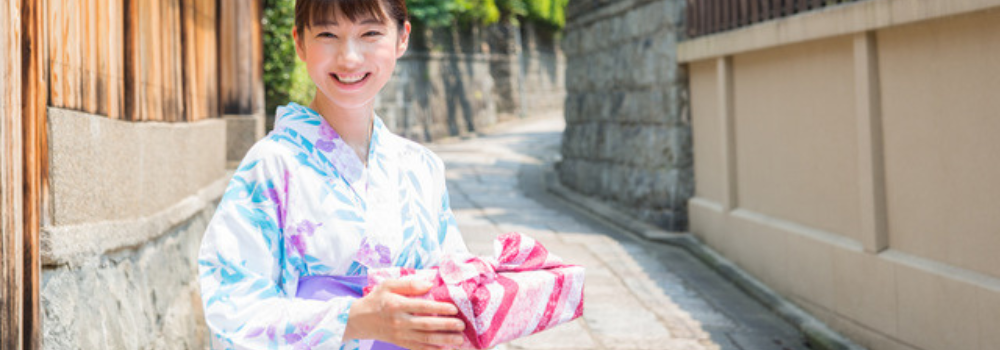
Summer Gifts - Ochugen
Share
Ochugen (pronunciation) is the Japanese custom of sending gifts to family, friends, and even business associates as a small token to say ‘thank you’ for a job well done for the first half of the year and to wish them well-being for the next half. Ochugen gifts are often given to bosses, coworkers, teachers, colleagues, and other important people in our lives.
It usually occurs between late-July and mid-August (July in some cities but August is also fine most of time). Fruits, beer, and cold foods are popular ochugen gifts during the summertime celebration.
As you may already know, in Japan the act of giving a present can be even more important than the present itself.
The gift that is given as ochugen is usually something small, such as a fruit basket or a box of chocolates. In recent years, the cost of giving ochugen has increased due to the rising cost of living in Japan. However, most people still spend between 3000 yen ($22) and 5000 yen ($37) on ochugen gifts. Ochugen is still a popular tradition in Japan, and many people look forward to giving and receiving gifts during this time of year.
In Japan, the practice of giving ochugen gifts is a tradition that dates back centuries. Ochugen gifts are typically given to people who have been kind or helpful to the giver during the year, such as a neighbor or teacher. The gifts are usually sent in July, and they often take the form of food or household items. While the practice of giving ochugen gifts is not as commonplace as it once was, it is still considered an important part of Japanese culture. For many people, it is a way to show their appreciation for others and strengthen relationships.
The Japanese tradition of ochugen dates back to the Meiji period (October 23, 1868 to July 30, 1912), when it was introduced as a way to show appreciation for employees during the hot summer months. The tradition is still alive today, and ochugen remains an important part of Japanese culture. The gifts are usually food items or other consumables such as personal care, and they are typically given in odd numbers (3, 5, 7, etc.), as odd numbers are considered lucky in Japanese culture. While the ochugen tradition has changed over the years, it remains an important part of Japanese culture and helps to create strong bonds between people.
Ochugen is a Japanese tradition that typically takes place during the o-bon festival. The o-bon festival is a two-week period in which people visit the graves of their ancestors and pay their respects. Ochugen is usually held on the 15th day of the 7th month of the lunar calendar, which falls in August. The tradition is thought to have started during the Edo period when people would give gifts to Buddhist temples as a way of expressing their gratitude for the teachings of Buddha. Over time, the practice of giving ochugen gifts spread to include friends and family members. Today, ochugen is an important part of Japanese culture, and many people look forward to exchanging gifts with loved ones during this special time of year.
Ochugen is a Japanese tradition that dates back centuries and is a tradition is based on the idea that it is important to express gratitude for the kindness and support that we receive from others. Ochugen gifts are usually given in thanks for favors or services that have been rendered, such as help with a difficult project or advice during a time of trouble. They are also given as a way of showing appreciation for someone's presence in our lives. In recent years, ochugen has become increasingly popular, with many people sending gifts to colleagues, neighbors, and even strangers. While the tradition may seem like a simple act of kindness, it plays an important role in strengthening relationships and promoting a sense of community.
These gifts are typically sent to family, friends, and colleagues, and they generally consist of food items such as fruit, tea, or sweets. While Ochugen is not an overly formal occasion, it is still important to choose a gift that is both meaningful and practical. For example, giving a box of high-quality tea leaves would be a thoughtful way to show appreciation for someone who is always working hard. Alternatively, a gift basket filled with delicious fruits and snacks would be a welcome treat for anyone who needs a little pick-me-up. No matter what type of gift you choose, Ochugen is an excellent opportunity to let the people in your life know how much you appreciate them.
Here are some common questions about Ochugen:
- Do Ochugen gifts have to be wrapped?
No, Ochugen gifts do not have to be wrapped. However, many people choose to wrap their gifts in order to make them look more special. If you are giving an Ochugen gift to someone who you know is busy, it may be helpful to wrap the gift so that they can open it later. A reusable gift-wrapping cloth is a perfect option!
- What are some popular Ochugen gifts?
Some popular Ochugen gifts include food items, such as fruit baskets, boxes of chocolates, and bottles of sake. Ochugen gifts can also be non-food items, such as books, clothes, or household items. If you are unsure what to give as an Ochugen gift, it is always a good idea to ask the person for their wish list.
- Do you have to give Ochugen gifts to everyone in your life?
No, you do not have to give Ochugen gifts to everyone in your life. Ochugen is a tradition that is typically celebrated between friends and family members. If you are close with someone, such as a boss or coworker, you may choose to give them an ochugen gift. However, it is not required.
- What is the best way to celebrate Ochugen?
There is no one correct way to celebrate Ochugen. It is up to each individual to decide how they want to celebrate. Some people prefer to give Ochugen gifts in person, while others choose to send them by mail. If you are celebrating Ochugen with family or friends, you may want to have a party or picnic.
